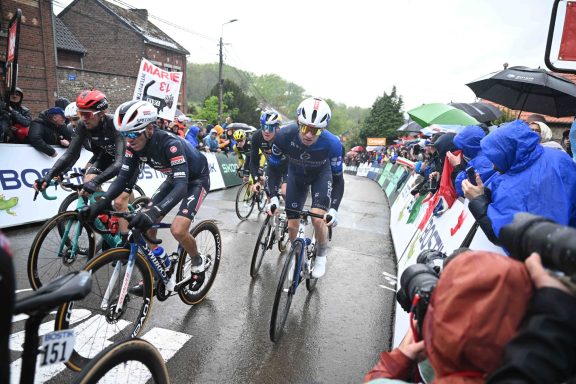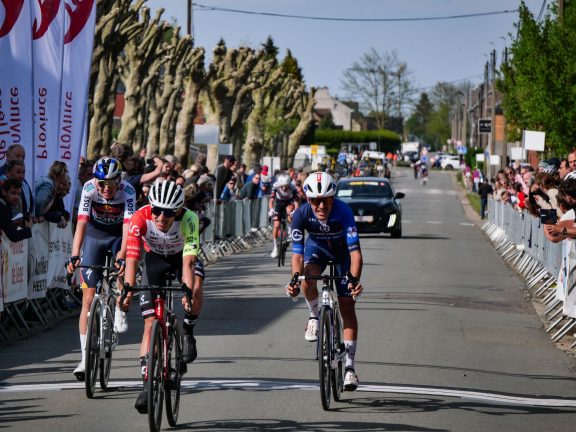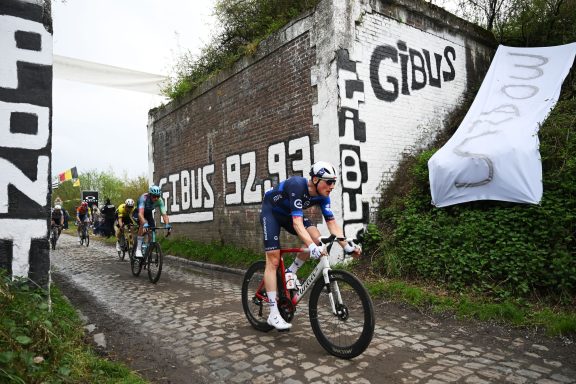It wasn’t for lack of trying. Yet, the Groupama-FDJ cycling team didn’t manage to repeat last season’s incredible hat-trick in the Franche-Comté region. After Guillaume Martin-Guyonnet’s win on Friday and Saturday, Thierry Bricaud’s riders did everything they could in the Tour du Doubs on Sunday, but a less suitable final meant they couldn’t break away from the competition before the finish in Morteau. Clément Braz Afonso and his leader, however, proved very active and placed fourth and sixth respectively, allowing the eldest to strengthen his lead on the FDJ French Cup standings.
Despite a positive elevation gain significantly similar to that of the Classic Grand Besançon Doubs and the Tour du Jura, the Tour du Doubs however looked to be more open this Sunday, between Pontarlier and Morteau. First, the elevation gain was spread over nearly 200 kilometres, but more importantly, the finish wasn’t located at the summit this time. Therefore, the strategic approach was completely different for Groupama-FDJ. “We knew it was going to be more difficult because the final wasn’t as hard as the two previous races,” explained Thierry Bricaud. “There was a long downhill and flat section to reach the finish. So we planned to make it hard an hour from the finish, which we did and did well.” When the peloton reached the bottom of the long climb up Roche du Prêtre, fifty kilometres from the finish, Clément Braz Afonso got going after a pull from Tom Donnenwirth, while the early breakaway was still one minute ahead. Although the young rider broke away alone and got closer to the break, he couldn’t take a real gap on a well-organized peloton. He was caught towards the summit, then his leader Guillaume Martin-Guyonnet tested his rivals for the first time. The bunch stretched out but didn’t explode. “It was hard but not too hard, which meant there were still a lot of riders hanging on,” explained Thierry.
“We can be proud of the way we rode”, Clément Braz Afonso
Forty kilometres from the finish, a new race started after the early breakaway was caught, and a handful of riders then went up the road. Their lead never exceeded half a minute over the peloton, however, and was reduced to barely twenty seconds at the bottom of the Côte du Barboux (1.6 km at 10.5%), the last really hard climb of the day. It was at this point, with twenty kilometres to go, that Groupama-FDJ went all in. “I increased the pace on the climb and seven of us broke away”, Clément said. At the summit, this group went clear from the rest of the competition and then managed to maintain a relatively good cooperation. “Clément and Guillaume were in the good move, but it wasn’t easy to play and try something,” Thierry added. “We wanted to pull up until the last two kilometres, and then try to attack, but with the peloton right behind, it was complicated, and the finish line came quickly.” The French climber proved among the most active up front. “I wouldn’t have done as much if I had been alone, but there was Clément, and I also wanted to return the favour after all the support he gave me these last few days,” said Guillaume. “It would also have been difficult to stay away solo until the finish, so we first had to make sure that this small group made it to the finish.”
A fifteen-second gap remained on the last false flat, then on the descent to Morteau, where the seven men came together. With 1,500 metres to go, Clément Braz Afonso still gave it a final go. “I wanted to attack because I knew we weren’t the fastest in the sprint,” he said. “I attacked, they followed me, then Guillaume counterattacked. I thought he was going to break away alone, but the Euskaltel rider made the effort”. “If there had been a moment of hesitation behind me, as often happens in these cases, I would have gone all the way,” Guillaume confessed. “It wasn’t decided by much.” So it was a sprint that decided the victory, and Mattéo Vercher won it, a few bike lengths ahead of Clément Braz Afonso, who came fourth. “I’m not far from finishing on the podium despite my attack, which I really felt in the legs,” he said. “Of course we didn’t achieve the hat-trick, but I think we can be proud of the way we rode. It didn’t go our way today, but that’s how you have to race to win. The team won’t be satisfied with fourth place, but for me, it’s already something. I wasn’t capable of doing that last year.”
“A superb weekend”, Thierry Bricaud
As for Guillaume Martin-Guyonnet, he finished sixth on Sunday after his two victories at the summit of La Malate and Mont Poupet. “It would have been fantastic for the team to achieve a hat-trick, but I think we did nothing wrong,” said the French climber. “We rode the race we had to. We can’t have many regrets. The balance of the weekend is obviously positive. We always want more, but it could also have been worse. I’m now going to try to recover well ahead of La Flèche Wallonne and Liège-Bastogne-Liège.” “We can be frustrated by today’s result, but in terms of attitude, there’s nothing to say,” concluded Thierry. “We did what we had planned. We missed the victory, but the spirit was the right one. It’s by racing like this in the next races that we’ll get other victories. We won the first two days, and we were active on the third. It’s a superb weekend that will give everyone a boost.”


